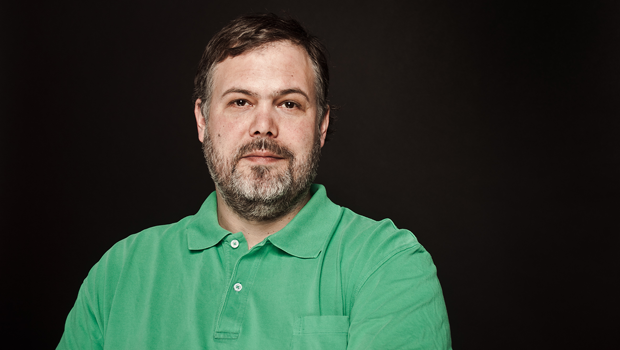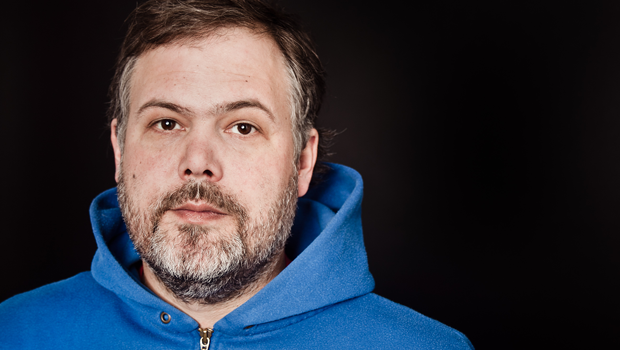Anche per Nick Höppner è iniziatà così, solo per divertimento. Erano gli anni ’90 e ci si divertiva a mettere i dischi nei bar, senza pensare che vent’anni dopo ci si sarebbe ritrovati dietro ad una delle istituzioni della musica come il Berghain. Nick è una persona semplice, riconoscente, vive di ciò che ama e nutre profondo rispetto per i pensieri e le opere delle altre figure che operano nel mondo della musica come lui. Il signor Ostgut Ton è persona dalle idee chiare e molto dirette, idee che siamo riusciti ad intercettare in uno dei suoi rari momenti liberi.
Ciao Nick, è stato abbastanza difficile trovare un momento per fare una chiacchierata…i viaggi, la tua label, il tempo in studio, il Berghain e tutto il resto hai pochissimo tempo. Guardando al passato, a quando hai iniziato, avresti mai pensato che tutto questo sarebbe accaduto?
Non proprio. Quando ho iniziato a fare il dj nei piccoli bar negli anni ’90 era solo per divertimento. Solo dopo esser arrivato a Berlino nel 2001 ed esser diventato resident nel vecchio Panorama Bar allora si che si è presentata una possibilità che accadesse tutto ciò.
Tutto il resto è stato il risultato di anni di lavoro e passione. Com’è cambiata la tua vita?
Be, oggi sono nella fortunata situazione che mi da modo di mantenere la mia famiglia con ciò che faccio, ogni weekend viaggio in posti dove non son mai stato e ciò è molto bello. Sono molto riconoscente del fatto che posso vivere di ciò che amo. Nella mia vita ho fatto moltissimi lavoretti e questo mi fa’ ancor di più apprezzare quello che sto facendo oggi.
Uno dei più grandi traguardi da te raggiunti è collegato al Berghain, cosa rappresenta il Berghain oggi? Sia musicalmente che culturalmente. Ti chiedo questo perché il Berghain rappresenta un modo unico di intendere la serata, diverso da tutti gli altri club del mondo.
Penso che oggi il Berghain rappresenti la continuità. Dopo molti anni è ancora un club incredibile che ispira legioni di clubbers, dj e anche produttori. Musicalmente parlando è la mia casa, mi diverto sempre a quando suono li, la situazione mi supporta e mi da’ sensazioni che negli altri club non riesco a percepire. Mi da modo di esprimermi con dei set lunghissimi, cosa che non ho modo di fare in un set di due ore. Poi c’è anche la clientela regolare che mi conosce da molti anni. Loro sanno cosa aspettarsi da me e cosa no, c’è una sorta di relazione speciale tra il dj e il pubblico…
Essere una parte importante del Berghain/Panorama Bar ti da la possibilità di avere una visione chiara della scena underground di Berlino. Il suono di una città però non è collegato solo ad un posto…com’è la scena underground di al di fuori del Berghain?
Ho una chiara visione del Berghain, non di tutta Berlino. Penso dovresti parlare con la gente che gestisce gli altri club se sei interessato a questo. Non voglio mettermi a commentare le cose in cui non son coinvolto. Spero capiate…
La cultura underground è un qualcosa di diffuso per tutta la nazione e anche per tutta l’Europa. Com’è la scena in questo senso secondo te? Cosa ne pensi?
Un qualcosa di diffuso rimane underground? Non ne sono così sicuro. L’underground è una cosa con cui non voglio aver a che fare. Il Berghain è un club, è molto popolare, e anche le persone che non ci andranno mai sanno di cosa si tratta. Oltre a questo penso che l’essere undeground non significhi esser per forza di qualità. C’è roba underground che fa schifo come c’è roba mainstream che fa schifo. Comunque per rispondere alla tua domanda posso fare un commento sulla scena europea. Posso dire che vedo moltissime cose. Molte di queste sembrano davvero promettenti, altre meno. Parlando in generale posso dire che le persone in giro per l’Europa abbiano imparato molto sulla musica dance e sulla sua storia. Sanno cosa stanno facendo e sempre molte più persone seguono cosa è di loro gradimento e non cosa è popolare, e questo è una cosa molto positiva.
Parlando della scena musicale possiamo dire che un ruolo importante è svolto dalle label, parlando di te possiamo dire che ne gestisci una delle più importanti: Ostgut Ton. Come è nata? Qual è l’idea che ci sta dietro?
Ostgut Ton è la label del Berghain/Panorama Bar ed è nata nel 2005. È una piattaforma per tutti gli artisti più vicini al club. Molto semplice.
Parlando di Ostgut Ton sappiamo che sta per uscire il Panorama Bar 05 mixato da Steffi. Qual è l’idea che sta dietro a questa compilation? E per quanto riguarda Steffi, cosa ci puoi dire?
Onestamente penso che dobbiate chiedere a Steffi per la compilation, a quel punto lei vi potrà dire anche come va la sua vita.
Ultima domanda, noi siam sempre curiosi di saper qualcosa riguardo al futuro. Puoi dirci qualcosa riguardo a Ostgut Ton? Nuove release? Nuovi Progetti?
Sta per uscire un nuovo 12’’ targato Virginia. Anche Rolando sta per far uscire una sua nuova record. Su Unterton ci sarà un nuovo 12’’ di Black Dog contenente anche un remix incredibile di L.B. Dub Corp. Più avanti verrà rilasciato l’album di debutto di Marcel Fangler e in giugno pubblicheremo della musica richiesta dalla “Deutsches Staatsballett” per un nuovo show al Berghain. Gli artisti coinvolti saranno: Marcel Fengler & Efdemin, Marcel Dettmann & Frank Wiedemann (Âme) e Henrik Schwarz.
English Version:
Also for Nick Höppner it started in a very simple way, just for fun. It was the ’90 and many guys were having fun dropping records in the bars and they didn’t think about that twenty years later some of them will be part of an istitution of the music like Berghain. Nick Hoppner is a very simple person, thankful, he lives with is love of the music and he put so much respect in all the thoughts and action of the others people that are involved in the music world. Nick Hoppner has clear and direct ideas, ideas that we were able to intercept, stealing it from one of his rare spare moment.
Hi Nick, it was pretty hard to find a moment to have a chat with you…I mean touring, your label, studio time, Berghain, so many things. Looking to the past, when you started, did you ever think that all these things would happen?
Not at all. When I started djing in the 90s it was always just for fun in small bars. Only after moving to Berlin in 2001 and becoming a resident at the old Panorama Bar it became an option.
All that is the result of years of work and passion, how is changed your life?
Well, I am in the very fortunate situation right now to support my family with what I am doing. I am also going to a lot of places every weekend I haven’t been to before, so I’m seeing a lot of the world which is really nice. I am very thankful that I can make a living from what I truly love. I have done a lot of odd jobs in my life. That makes me even more appreciate what I am doing now.
One of the main achievements that you reached in your life is linked to the Berghain, what represent Berghain nowadays? Musically speaking but also cultural speaking becauseBerghain is a unique way to intend the club night, completely different to the other clubs in the world.
I think what Berghain mostly represents today is continuity. After many years, it still is an amazing nightclub that inspires legions of clubbers, djs and producers alike. It is my musical home and I always have a great time playing there, as the club provides me with a situation, I don’t get so much, when I’m playing in other clubs: I can play really long sets and express myself in ways I don’t get the chance to in a standard two hour set. Also, the regular crowd knows me well after so many years. They know what to expect from me and what not, so that is a special kind of dj/crowd relationship…
Being a very important part of Berghain/Panorama Bar organization gives to you clear vision from the inside of the underground scene of Berlin, but the sound of a city is not only linked to a place…how is now the underground scene of Berlin also outside the Berghain?
It gives me a clear vision regarding Berghain, not all of Berlin. I think you should talk to other people running or playing at other clubs, if you’re interested in that. I don’t want to put myself in a position to comment on things I am not really involved with. I hope you understand…
The underground culture is something that is widespread all over the country and all over the Europe. How is the scene now in your opinion? What do you think about?
When something is widespread, is it still Underground? I am not sure Underground is a category I want to work with. Berghain as a club surely is not underground. It is very popular and a lot of people who might never go there know about it anyway. I also think that Underground is not a sign of quality per se. There is shit underground music and there is shit mainstream music. But to answer your question: I can’t comment on the entire scene in Europe. All I can say is that I see a lot of stuff going on. Some of it seems really promising, some of it doesn’t. Generally speaking, I have the feeling that people all over Europe have learnt a lot about dance music and its history. They really know their stuff. More and more people follow what they like and not what’s popular, that’s a great thing.
Talking about the musical scene we can say that an important role is played by the labels, and form this point of view you are managing one of the most important: Ostgut Ton. How is born? What is the idea that stays behind this label?
Ostgut Ton is the label of Berghain/Panorama Bar and it started late 2005. It’s there as a platform for all the artists closely related to the club. Really simple.
Talking about Ostgut Ton is coming out Panorama Bar 05, mixed by Steffi. What’s the idea of this mixed compilation? And what about Steffi? What can you tell us.
I think you really should ask Steffi about the idea of her mix compilation, to be honest. She then can tell you what’s going on in her life, too.
Last question, we are always curious to know something about the future. Can you reveal us something about you Ostgut Ton? Release that are coming? New projects?
There’s a new Viriginia 12″ coming soon. Rolando will release a new record, too. On Unterton there will be a Black Dog 12″ with an amazing L.B. Dub Corp remix. Later in the year we will release Marcel Fengler’s debut album. In June we will release music commissioned by the “Deutsches Staatsballett” for a new show at Berghain. The music is coming from Marcel Fengler & Efdemin, Marcel Dettmann & Frank Wiedemann (Âme) and Henrik Schwarz.




